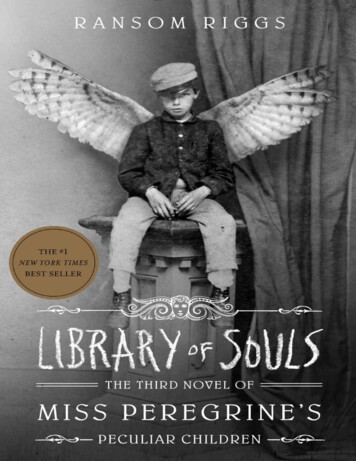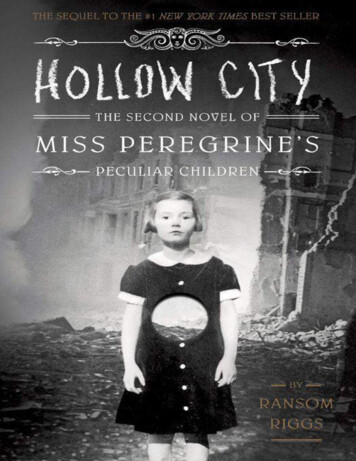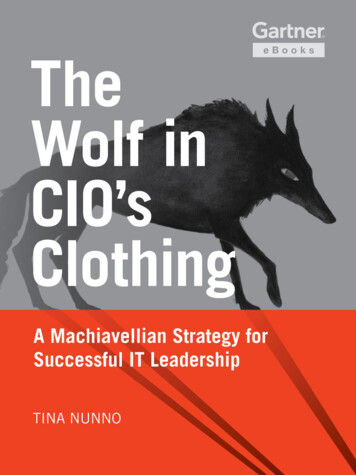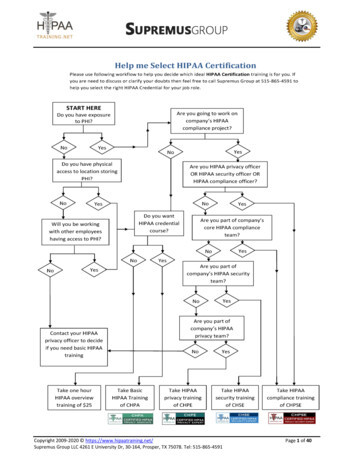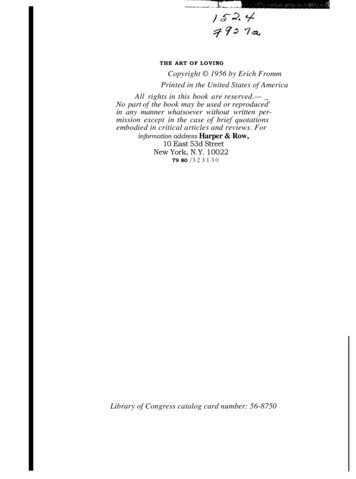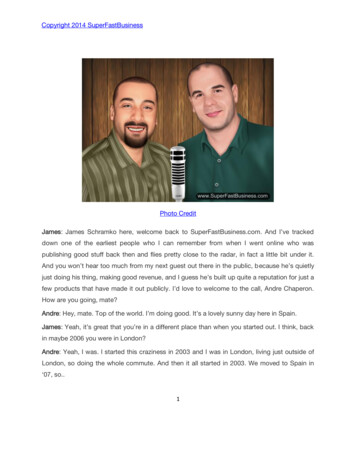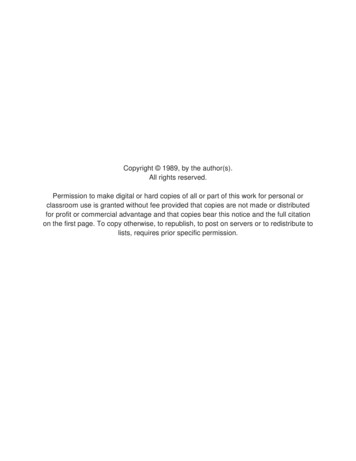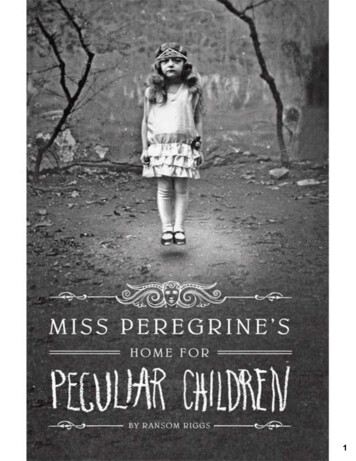
Transcription
1
Copyright 2011 by Ransom RiggsAll rights reserved. No part of this book may be reproduced in any form without written permission from the publisher.Library of Congress Cataloging in Publication Number: 2010942876eISBN: 978-1-59474-513-3Cover photograph courtesy of Yefim Tovbise-book production management by Melissa JacobsonQuirk Books215 Church StreetPhiladelphia, PA 19106quirkbooks.comv3.12
SLEEP IS NOT, DEATH IS NOT;WHO SEEM TO DIE LIVE.HOUSE YOU WERE BORN IN,FRIENDS OF YOUR SPRING-TIME,OLD MAN AND YOUNG MAID,DAY ’S TOIL AND ITS GUERDON,THEY ARE ALL VANISHING,FLEEING TO FABLES,CANNOT BE MOORED.—Ralph Waldo Emerson3
ContentsCoverTitle aph CreditAcknowledgments4
5
I had just come to accept that my life would be ordinary when extraordinary thingsbegan to happen. The first of these came as a terrible shock and, like anything thatchanges you forever, split my life into halves: Before and After. Like many of theextraordinary things to come, it involved my grandfather, Abraham Portman.Growing up, Grandpa Portman was the most fascinating person I knew. He had livedin an orphanage, fought in wars, crossed oceans by steamship and deserts on horseback,performed in circuses, knew everything about guns and self-defense and surviving in thewilderness, and spoke at least three languages that weren’t English. It all seemedunfathomably exotic to a kid who’d never left Florida, and I begged him to regale mewith stories whenever I saw him. He always obliged, telling them like secrets that couldbe entrusted only to me.When I was six I decided that my only chance of having a life half as exciting asGrandpa Portman’s was to become an explorer. He encouraged me by spendingafternoons at my side hunched over maps of the world, plotting imaginary expeditionswith trails of red pushpins and telling me about the fantastic places I would discover oneday. At home I made my ambitions known by parading around with a cardboard tubeheld to my eye, shouting, “Land ho!” and “Prepare a landing party!” until my parentsshooed me outside. I think they worried that my grand father would infect me with someincurable dreaminess from which I’d never recover—that these fantasies were somehowinoculating me against more practical ambitions—so one day my mother sat me downand explained that I couldn’t become an explorer because everything in the world hadalready been discovered. I’d been born in the wrong century, and I felt cheated.I felt even more cheated when I realized that most of Grandpa Portman’s best storiescouldn’t possibly be true. The tallest tales were always about his childhood, like how hewas born in Poland but at twelve had been shipped off to a children’s home in Wales.When I would ask why he had to leave his parents, his answer was always the same:because the monsters were after him. Poland was simply rotten with them, he said.“What kind of monsters?” I’d ask, wide-eyed. It became a sort of routine. “Awfulhunched-over ones with rotting skin and black eyes,” he’d say. “And they walked likethis!” And he’d shamble after me like an old-time movie monster until I ran awaylaughing.Every time he described them he’d toss in some lurid new detail: they stank likeputrefying trash; they were invisible except for their shadows; a pack of squirmingtentacles lurked inside their mouths and could whip out in an instant and pull you intotheir powerful jaws. It wasn’t long before I had trouble falling asleep, my hyperactiveimagination transforming the hiss of tires on wet pavement into labored breathing justoutside my window or shadows under the door into twisting gray-black tentacles. I was6scared of the monsters but thrilled to imagine my grandfather battling them and
surviving to tell the tale.More fantastic still were his stories about life in the Welsh children’s home. It was anenchanted place, he said, designed to keep kids safe from the monsters, on an islandwhere the sun shined every day and nobody ever got sick or died. Everyone livedtogether in a big house that was protected by a wise old bird—or so the story went. As Igot older, though, I began to have doubts.“What kind of bird?” I asked him one afternoon at age seven, eyeing him skepticallyacross the card table where he was letting me win at Monopoly.“A big hawk who smoked a pipe,” he said.“You must think I’m pretty dumb, Grandpa.”He thumbed through his dwindling stack of orange and blue money. “I would neverthink that about you, Yakob.” I knew I’d offended him because the Polish accent hecould never quite shake had come out of hiding, so that would became vood and thinkbecame sink. Feeling guilty, I decided to give him the benefit of the doubt.“But why did the monsters want to hurt you?” I asked.“Because we weren’t like other people. We were peculiar.”“Peculiar how?”“Oh, all sorts of ways,” he said. “There was a girl who could fly, a boy who had beesliving inside him, a brother and sister who could lift boulders over their heads.”It was hard to tell if he was being serious. Then again, my grandfather was not knownas a teller of jokes. He frowned, reading the doubt on my face.“Fine, you don’t have to take my word for it,” he said. “I got pictures!” He pushedback his lawn chair and went into the house, leaving me alone on the screened-in lanai.A minute later he came back holding an old cigar box. I leaned in to look as he drew outfour wrinkled and yellowing snapshots.The first was a blurry picture of what looked like a suit of clothes with no person inthem. Either that or the person didn’t have a head.“Sure, he’s got a head!” my grandfather said, grinning. “Only you can’t see it.”“Why not? Is he invisible?”“Hey, look at the brain on this one!” He raised his eyebrows as if I’d surprised himwith my powers of deduction. “Millard, his name was. Funny kid. Sometimes he’d say,‘Hey Abe, I know what you did today,’ and he’d tell you where you’d been, what youhad to eat, if you picked your nose when you thought nobody was looking. Sometimeshe’d follow you, quiet as a mouse, with no clothes on so you couldn’t see him—justwatching!” He shook his head. “Of all the things, eh?”He slipped me another photo. Once I’d had a moment to look at it, he said, “So? Whatdo you see?”“A little girl?”“And?”“She’s wearing a crown.”He tapped the bottom of the picture. “What about her feet?”I held the snapshot closer. The girl’s feet weren’t touching the ground. But she wasn’t7jumping—she seemed to be floating in the air. My jaw fell open.
“She’s flying!”“Close,” my grandfather said. “She’s levitating. Only she couldn’t control herself toowell, so sometimes we had to tie a rope around her to keep her from floating away!”My eyes were glued to her haunting, doll-like face. “Is it real?”“Of course it is,” he said gruffly, taking the picture and replacing it with another, thisone of a scrawny boy lifting a boulder. “Victor and his sister weren’t so smart,” he said,“but boy were they strong!”“He doesn’t look strong,” I said, studying the boy’s skinny arms.“Trust me, he was. I tried to arm-wrestle him once and he just about tore my handoff!”But the strangest photo was the last one. It was the back of somebody’s head, with aface painted on it.8
9
10
11
I stared at the last photo as Grandpa Portman explained. “He had two mouths, see?One in the front and one in the back. That’s why he got so big and fat!”“But it’s fake,” I said. “The face is just painted on.”“Sure, the paint’s fake. It was for a circus show. But I’m telling you, he had twomouths. You don’t believe me?”I thought about it, looking at the pictures and then at my grandfather, his face soearnest and open. What reason would he have to lie?12
“I believe you,” I said.And I really did believe him—for a few years, at least—though mostly because Iwanted to, like other kids my age wanted to believe in Santa Claus. We cling to ourfairy tales until the price for believing them becomes too high, which for me was the dayin second grade when Robbie Jensen pantsed me at lunch in front of a table of girls andannounced that I believed in fairies. It was just deserts, I suppose, for repeating mygrandfather’s stories at school but in those humiliating seconds I foresaw the moniker“fairy boy” trailing me for years and, rightly or not, I resented him for it.Grandpa Portman picked me up from school that afternoon, as he often did when bothmy parents were working. I climbed into the passenger seat of his old Pontiac anddeclared that I didn’t believe in his fairy stories anymore.“What fairy stories?” he said, peering at me over his glasses.“You know. The stories. About the kids and the monsters.”He seemed confused. “Who said anything about fairies?”I told him that a made-up story and a fairy tale were the same thing, and that fairytales were for pants-wetting babies, and that I knew his photos and stories were fakes. Iexpected him to get mad or put up a fight, but instead he just said, “Okay,” and threwthe Pontiac into drive. With a stab of his foot on the accelerator we lurched away fromthe curb. And that was the end of it.I guess he’d seen it coming—I had to grow out of them eventually—but he droppedthe whole thing so quickly it left me feeling like I’d been lied to. I couldn’t understandwhy he’d made up all that stuff, tricked me into believing that extraordinary things werepossible when they weren’t. It wasn’t until a few years later that my dad explained it tome: Grandpa had told him some of the same stories when he was a kid, and they weren’tlies, exactly, but exaggerated versions of the truth—because the story of GrandpaPortman’s childhood wasn’t a fairy tale at all. It was a horror story.My grandfather was the only member of his family to escape Poland before theSecond World War broke out. He was twelve years old when his parents sent him intothe arms of strangers, putting their youngest son on a train to Britain with nothing morethan a suitcase and the clothes on his back. It was a one-way ticket. He never saw hismother or father again, or his older brothers, his cousins, his aunts and uncles. Each onewould be dead before his sixteenth birthday, killed by the monsters he had so narrowlyescaped. But these weren’t the kind of monsters that had tentacles and rotting skin, thekind a seven-year-old might be able to wrap his mind around—they were monsters withhuman faces, in crisp uniforms, marching in lockstep, so banal you don’t recognize themfor what they are until it’s too late.Like the monsters, the enchanted-island story was also a truth in disguise. Comparedto the horrors of mainland Europe, the children’s home that had taken in mygrandfather must’ve seemed like a paradise, and so in his stories it had become one: asafe haven of endless summers and guardian angels and magical children, who couldn’treally fly or turn invisible or lift boulders, of course. The peculiarity for which they’dbeen hunted was simply their Jewishness. They were orphans of war, washed up on thatlittle island in a tide of blood. What made them amazing wasn’t that they 13had
miraculous powers; that they had escaped the ghettos and gas chambers was miracleenough.I stopped asking my grandfather to tell me stories, and I think secretly he wasrelieved. An air of mystery closed around the details of his early life. I didn’t pry. He hadbeen through hell and had a right to his secrets. I felt ashamed for having been jealousof his life, considering the price he’d paid for it, and I tried to feel lucky for the safe andunextraordinary one that I had done nothing to deserve.Then, a few years later, when I was fifteen, an extraordinary and terrible thinghappened, and there was only Before and After.14
15
I spent the last afternoon of Before constructing a 1/10,000-scale replica of the EmpireState Building from boxes of adult diapers. It was a thing of beauty, really, spanningfive feet at its base and towering above the cosmetics aisle, with jumbos for thefoundation, lites for the observation deck, and meticulously stacked trial sizes for itsiconic spire. It was almost perfect, minus one crucial detail.“You used Neverleak,” Shelley said, eyeing my craftsmanship with a skeptical frown.“The sale’s on Stay-Tite.” Shelley was the store manager, and her slumped shoulders anddour expression were as much a part of her uniform as the blue polo shirts we all had towear.“I thought you said Neverleak,” I said, because she had.“Stay-Tite,” she insisted, shaking her head regretfully, as if my tower were a crippledracehorse and she the bearer of the pearl-handled pistol. There was a brief but awkwardsilence in which she continued to shake her head and shift her eyes from me to the towerand back to me again. I stared blankly at her, as if completely failing to grasp what shewas passive-aggressively implying.“Ohhhhhh,” I said finally. “You mean you want me to do it over?”“It’s just that you used Neverleak,” she repeated.“No problem. I’ll get started right away.” With the toe of my regulation black sneakerI nudged a single box from the tower’s foundation. In an instant the whole magnificentstructure was cascading down around us, sending a tidal wave of diapers crashing acrossthe floor, boxes caroming off the legs of startled customers, skidding as far as theautomatic door, which slid open, letting in a rush of August heat.Shelley’s face turned the color of ripe pomegranate. She should’ve fired me on thespot, but I knew I’d never be so lucky. I’d been trying to get fired from Smart Aid allsummer, and it had proved next to impossible. I came in late, repeatedly and with theflimsiest of excuses; made shockingly incorrect change; even misshelved things onpurpose, stocking lotions among laxatives and birth control with baby shampoo. Rarelyhad I worked so hard at anything, and yet no matter how incompetent I pretended tobe, Shelley stubbornly k
sleep is not, death is not; who seem to die live. house you were born in, friends of your spring-time, old man and young maid, day’s toil and its guerdon, they are all vanishing, fleeing to fables, cannot be moored. —ralph waldo emerson 3
